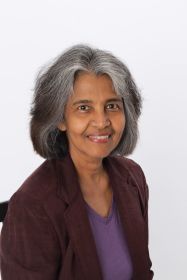The X Show, August 14, 2023
Special Guest Yasmin Azad will be discussing how traditional muslim communities have reacted to modern societal trends, particularly as they pertain to women's rights, and the rise of islamic fundamentalism. She's written a memoir of her time growing up in 60s-70s Sri Lanka, called Stay, Daughter, available today on Amazon
Guest Name, Yasmin Azad
“The resurgence of austere orthodox practices in the Islamic world, has, no doubt, its roots in complex geo-political issues,” says Azad, who now lives in Massachusetts. “But it's hard not to wonder whether such regression is also not, to a large extent, a push back against what is perceived as the evils of modernity.”
As Muslim women have become more educated and economically independent, they have also adopted new ideas about marriage and family. They are marrying later or not marrying at all. It is no longer unusual for them to marry outside their faith and community, nor to initiate divorce, the rates of which have skyrocketed in Sri Lanka as elsewhere in the Islamic world today. As the dual pressures of orthodox Islam and political fervor bear down, parents face the same challenge that came up three generations ago in the Galle Fort, when girls were first allowed to go to school.
How does one give a daughter her freedom while still upholding the traditions that sustain stable families and close-knit community? that is answered, with touching insight and deeply felt emotion in Stay, Daughter.
“A very raw, and personal look… The book looks at the complexities of the Muslim community.”
--BBC World News
"A loving and approachable coming-of-age story about generational change.
- Kirkus Reviews
"Yasmin Azad's Stay Daughter is a profound reflection on the dilemmas that Muslim women faced and are facing as orthodoxy and identity come up against freedom.”
- Radhika Coomaraswamy, Former Under Secretary-General of the United Nations
Azad is available to discuss the following:
· Why Muslim communities that were once moderate and liberal turned to Islamic fundamentalism with such force in the late-20th and early-21st centuries. The headscarf that one mother and grandmother discarded has been willingly assumed by some of their daughters and granddaughters.
· What happens to conservative Muslim communities when women are educated and become more economically independent. For example, marriage rates have gone down, and divorce rates have gone up in many formerly very orthodox Muslim countries.
· The challenge of balancing the rules of orthodox Islam with the freedom and innovations of the modern world especially as it relates to how girls and women dress, travel, interact with boys and men, etc.
· Loneliness, isolation, and the lack of connection, and how it has impacted mental health in the modern world. The real epidemic in the world is now said to be depression. There is a marked increase, for example of girls deliberately injuring themselves.
· The challenges faced by a child who must straddle two cultures. She is embarrassed and ashamed when the traditional culture she was born to does not meet the standards of more modern societies. Her relatives, for example, do not speak fluent English.
· The truth about women’s lives in traditional Muslim societies. They are not all oppressed and leading miserable lives. It is much more complex. Such societies also support the deep need most women have for community and connection.
Yasmin Azad is the author of Stay, Daughter, an engaging memoir of how a young Muslim girl grew up in Sri Lanka in the 1950s and ‘60s, and how she came to America after seeing what happens when cultures collide. Kirkus Reviews named her book as one of the best of the year.
Azad was among the first group of girls in her Muslim community in Sri Lanka to go away to university. Stay, Daughter draws on her experiences growing up in a close-knit, conservative society which had to deal with the challenge of reconciling the rules of Islamic orthodoxy with the freedoms and innovations of the modern world.
Born and raised in the Galle Fort, Sri Lanka (previously Ceylon) by a traditional Muslim family, she lived in what was a former colonial fortress, inhabited by Muslims, Buddhists, Hindus, and the Christian descendants of the Europeans who had colonized the island. Muslims are a 10% minority population in Sri Lanka, which is a Buddhist-majority nation. Her primary education was at Catholic schools run by Irish nuns, but her favorite teacher was a Hindu.
She came to America in the late 1970s and lived in Connecticut. She and her husband moved to Massachusetts and raised their three children there.
Azad had worked for over 20 years as an award-winning mental health counselor. She has a deep interest in the special and emotional repercussions on societies (both positive and negative), when women are raised in highly individualistic cultures as opposed to those that stress the importance of family and community.
She has been interviewed by, or featured in, numerous media outlets, including BBC World News, The National Magazine, Perspective Magazine, Daily News in Sri Lanka, and Sunday Island, in Sri Lanka.
Azad earned her BA in English from University of Ceylon, MA in English from University of Connecticut, and MA in Psychology from Fitchburg State college. She lectured in English for three years at University of Kelaniya, in Sri Lanka.
When she’s not writing essays and articles, she is gardening or practicing mindfulness meditation.
The X Show

The X Show is where we explore the issues surrounding life, business, and everything else. Hosted by Tony Xu and Donna Xu, we'll learn from the everyman, the business leader, and people who've found their true passions in life while experiencing what the world around us has to offer. Join us as we uncover the X factors of life on our little blue marble.
If you have any questions or comments about the show you can email us at tony@xucapital.co










